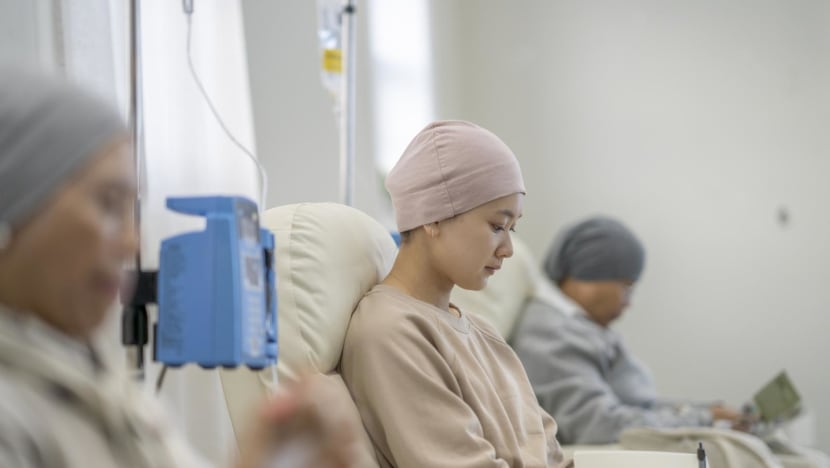Commentary: ‘Living funerals’ help the dying and their loved ones live more meaningfully
Unlike traditional funerals, living funerals are a platform for the terminally ill to share their wishes, fears and most importantly, their love for those they are leaving behind, says entrepreneur and cancer survivor Kristen Juliet Soh.


This audio is generated by an AI tool.
SINGAPORE: The story of a 29-year-old terminally ill woman who hosted her own living funeral struck a chord with Singapore netizens.
Michelle “Mike” Ng, who died on Jan 2 of ovarian cancer, called the event a “living funeral”, rather than a celebration of life, because she wanted death to be “close to heart and something that is not so scary”.
As a cancer survivor myself, diagnosed at 29, I understand the raw emotions and existential questions such a situation evokes. Cancer, or any terminal illness, forces you to confront your mortality head-on. It's a brutal wake-up call, shattering the illusion of limitless time.
A living funeral can be incredibly valuable for both the terminally ill and their loved ones. It's more than a celebration of life; it's a chance to actively engage with the present and to express love in a way that transcends the inevitability of death.
MAKING THE MOST OF NUMBERED DAYS
When I was first diagnosed, the world shrunk to a terrifyingly small space. But somewhere in that darkness, a flicker of defiance sparked. I craved not just survival, but a way to make the most of whatever time I had left.
Despite the daunting challenges of chemotherapy and the confines of a hospital bed, I found myself working even harder than before.
From that bed, I relentlessly built my media business, writing and editing articles, corresponding with business partners and launching a consumer study. It was as if my situation ignited an urgency to build something significant so I could leave behind a legacy.
Perhaps that's why the concept of a living funeral resonates so deeply. Traditional funerals are a necessary ritual of closure for the bereaved, but they occur after the opportunity for connection has passed.
A living funeral flips the script, allowing for open conversations about death, and giving the terminally ill a platform to share their wishes, fears, and most importantly, their love for those they are leaving behind.
NAVIGATING JOY AND GRIEF
Hosting a living funeral acknowledges the reality of the situation, bringing death out of the shadows and into the light. It creates a space where both joy and grief can coexist, fostering honesty and shared vulnerability.
Of course, navigating such a delicate balance won't be easy. Loved ones will undoubtedly feel a surge of emotions and the desperate desire to cling to hope.
But what if instead of focusing solely on the tears, we channelled that emotional energy into creating a positive experience?
Maybe we could use this gathering to create a bucket list and embark on adventures together. The time spent conquering those experiences, big or small, will create precious memories that offer solace long after the person is gone.
It's a way to rewrite the narrative, to ensure the final chapter is filled not just with sadness, but also with laughter, shared purpose and a reaffirmation of love's enduring power.

LIFE ISN’T GUARANTEED
Cancer forced me to confront a harsh truth: Life isn't guaranteed.
Before the diagnosis, I naively believed in a future stretching endlessly before me. I was only 29 and newly wedded for a month. My husband and I had short- and long-term plans from a honeymoon to Europe, to having children and building a business. But in an instant, those dreams were overshadowed by the stark reality of my diagnosis.
But my experience with cancer gave me the gift of perspective. I remember being asked a strange question - would I prefer a sudden death or a long battle?
Back then, I answered without hesitation: A long battle. And I think I would give the same answer today, even after having gone through a gruelling battle against cancer.
The reason? Time. Time to prepare myself mentally and to help my loved ones do the same.
A living funeral offers exactly that - precious time spent with loved ones, openly expressing emotions, and creating memories that become a testament to the life lived.
BE PRESENT WITH YOUR DYING LOVED ONES
When faced with a terminal illness, the worst thing loved ones can say is, "Don't worry, things will get better."
The truth is, they might not. But what can comfort the terminally ill is the genuine unwavering support of those around them.
Empty reassurances are meaningless. Actions speak louder. Be present. Listen. Ask the patient what they need, what they want to do, and then help them do it.
Fulfill their wishes, big or small, and create a space where they can express their fears and anxieties without judgment.
Living funerals might not be for everyone, but they offer a powerful alternative to traditional approaches to death and dying. They help us all to live more meaningfully not just in the face of death, but in every precious moment we have.
If I could choose, I hope to host a living funeral. I would want my loved ones to celebrate life with me until the end, and to have a final chance to deepen our bonds and create lasting memories.
For my loved ones, it may offer solace and closure, and for me, I think it’ll ease the loneliness of death.
Kristen Juliet Soh is the editorial director and co-founder of Daily Vanity and a survivor of lymphoma.


















